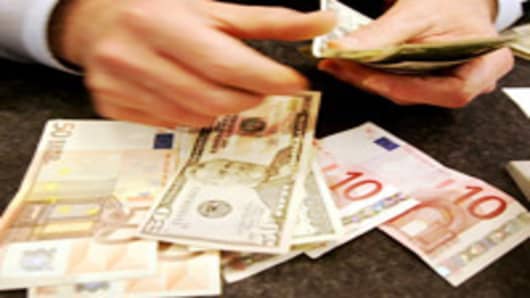And with many predicting that the Federal Reserve's rate cuts are over and some looking to a shift from growth to inflation, the balance of power could be leaning towards the greenback.
But any attempts to buy back into the dollar should be made with caution, as there are still pitfalls, analysts warned.
"The US, from a growth standpoint, was hammered. The economic indicators are levelling off," Peter Rosenstreich, chief market analyst at Advanced Currency Markets told CNBC.com.
We are beginning to see the "dollar-smile" theory -- which forecasts that the greenback, which began the year weaker, would strengthen in the middle of the year but will fall back towards the end -- emerge, Rosenstreich added.
"The smile part has been delayed, but we're starting to see it," he said. "We could see (the euro) as low as $.1.45 before it starts moving back through $1.60."
U.S. Trade Deficit Narrowing
Supporting a stronger dollar is the fact that the U.S. trade deficit, which narrowed 5.7 percent in March to $58.2 billion, more than expected, is improving as exports are boosted by the weak currency, some analysts say.
"We think the U.S. dollar has probably finished this whole major bear and generally is about to turn up," Scott Campbell from MitonOptimal Asset Management told Reuters.
"We have gone from having lots of euros and pounds…to now almost being 100 percent hedged back into U.S. dollars," Campbell added.
Fed funds futures showed that there are 98 percent chances that the Fed - which has come under criticism from some investors and analysts for lowering the rates too quickly and "debasing" the dollar – will keep rates on hold at its monetary policy meeting at the end of June.
Fed Chairman Ben Bernanke seemed to confirm this view when he made a rare public statement on the foreign exchange rate on Tuesday.
"We are attentive to the implications of changes in the value of the dollar for inflation and inflation expectations and will continue to formulate policy to guard against risks to both parts of our dual mandate," Bernanke told a meeting of bankers in Barcelona.
Official Backing
Authorities seem to jump more readily to support the greenback, after a period of muted reaction to its weakness. Treasury Secretary Henry Paulson recently beefed up his usual rhetoric on a strong dollar being in the interest of the U.S. by adding that he was committed to deal with the problems that were hurting the currency.
"I am committed to promoting policies that enhance the underlying competitiveness of the U.S. economy and ensure that the dollar remains the world's reserve currency," he told the U.S.-UAE Business Council earlier this week.
"These include being a strong advocate for open investment and trade, and working to address the current challenges in our economy, including the housing correction and stress in our capital markets," Paulson added.
But in the longer run the dollar is still vulnerable as there are fundamental weaknesses in the US economy such as the twin deficits and the way the US will be affected by energy prices, Rosenstreich said.
"Their reliance on energy is enormous. That's really going to sap the consumer," he added. "All this will play out through 2009."
The euro is still the currency to hold in the long term, Chris Towner, currency strategist at Halewood International FX, said.
"If you look at the credit crunch and which economies are going be affected, the U.S. economy is more exposed by the service sector than the euro zone," Towner told CNBC.com, adding that demand from Asia will help economies which rely more on industry than those that rely heavily on services.
"The credit crunch hasn't quite yet lost its bite… the implication of the credit crunch will still have a bigger impact on the US economy than the European economy," he said
-- Robin Knight contributed to this report


